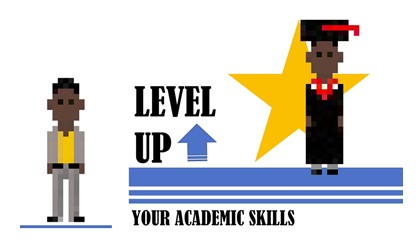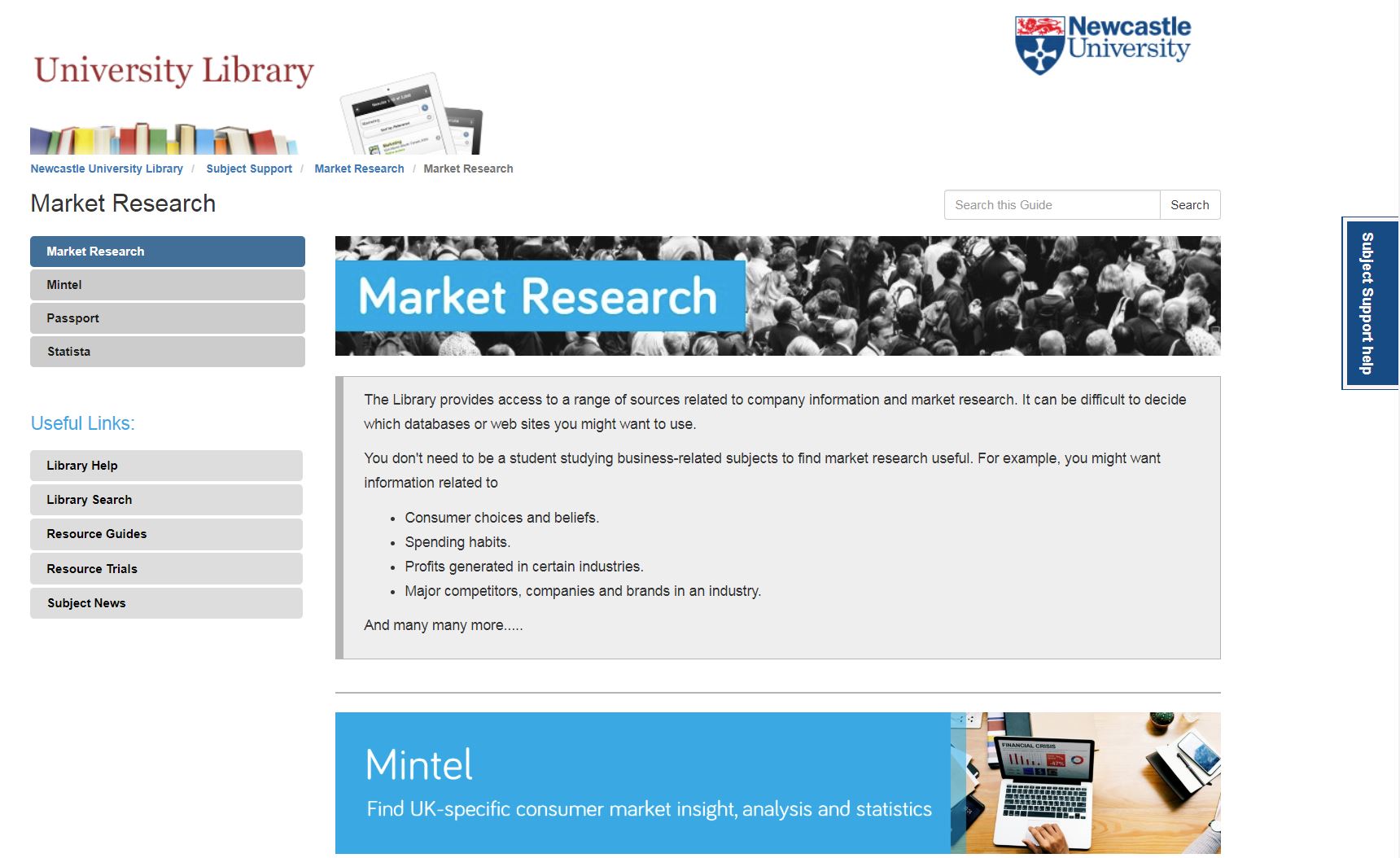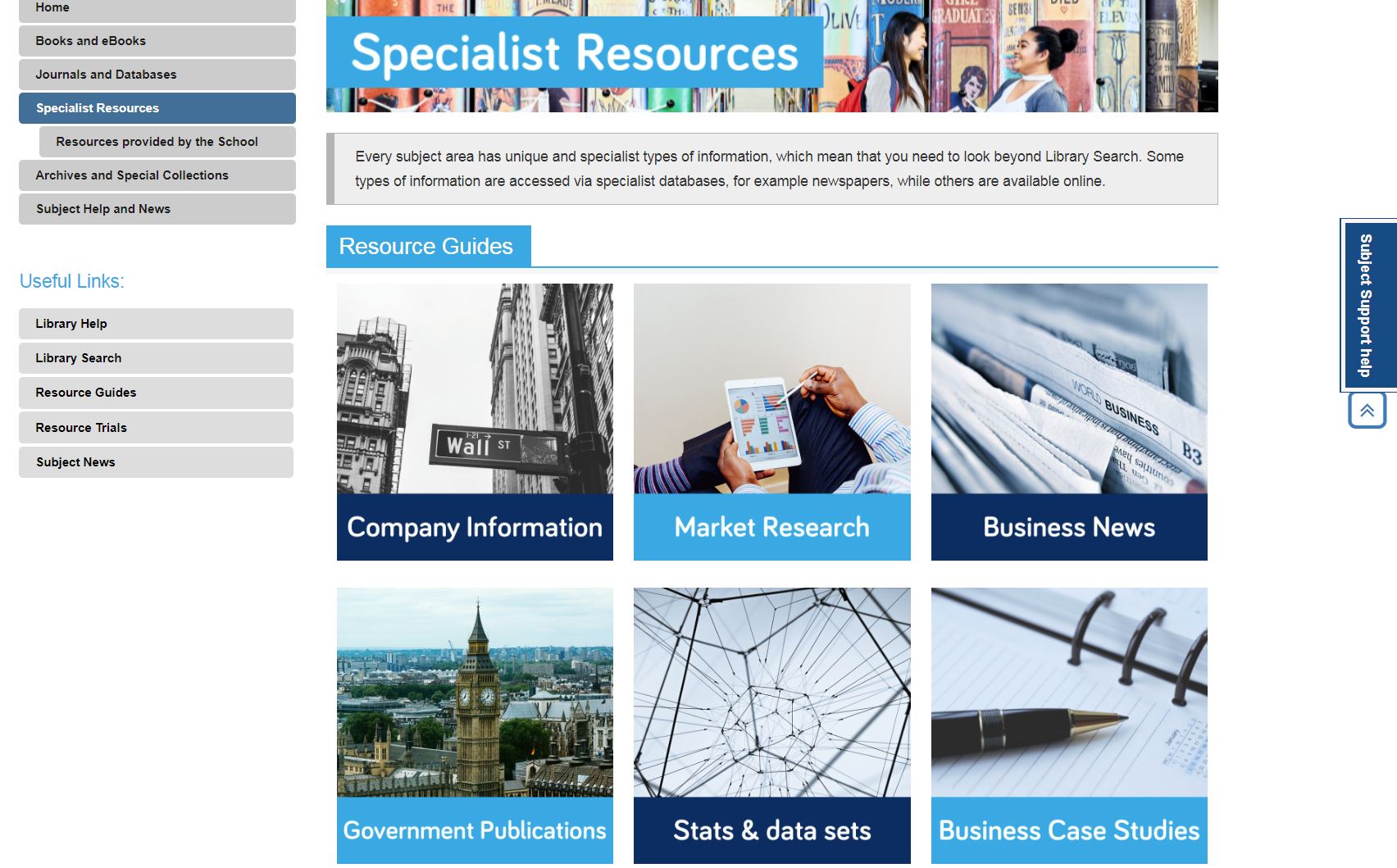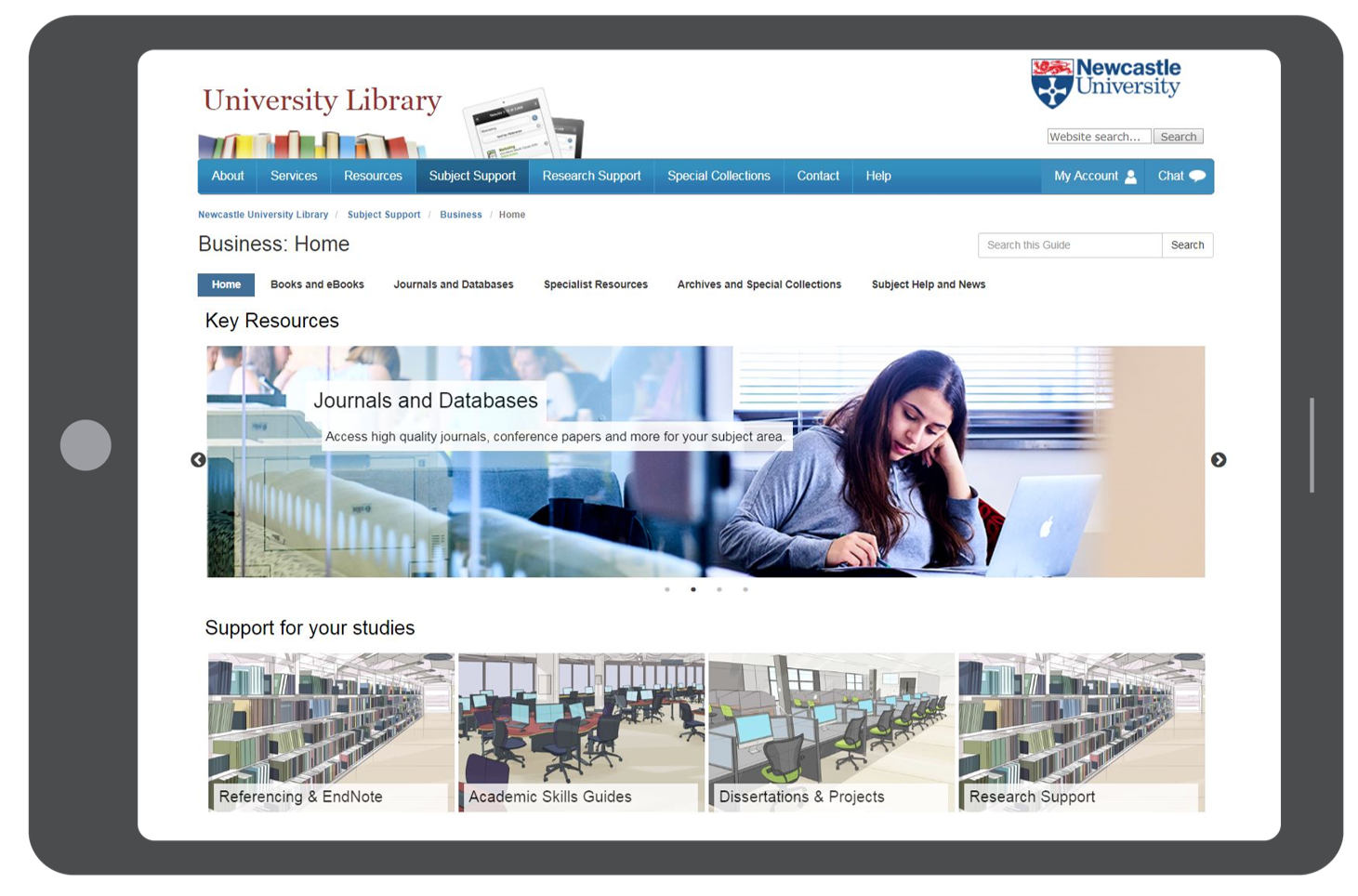Build your bag of tricks and special skills

We’re probably all familiar with the fact that the library is where you find the books, but this month, why not explore all of the other types of information that can add to your academic skills bag of tricks. The library’s Resource Guides draw together the best resources available, organised by the type of information rather than subject area.
So if you are trying to find historic newspapers, company financial data, market research, standards or images you will find a resource guide for all of that!

The guides are updated all the time as we add new subscriptions to our collection or identify online resources that we think will be useful for teaching and research. You’ll find the Resource Guides on the library website and as quick links on every Subject Guide https://www.ncl.ac.uk/library/resources-and-study-support/subject-guides/.

We’ve also highlighted the Resource Guides that are most commonly used for your subject area in the Specialist Resources section.

So next time you need to find a newspaper article, a government paper or some statistics to analyse, visit the Resource Guides to help you identify where to look.
Level up your academic study skills
Time to get your game face on and level up your academic skills!

Throughout your time at University, you are required to develop a whole range of important academic skills, from knowing where to find information to critical thinking to reference management. These skills are not only important for completing your degree successfully but they can also be transferred to the work you do once you leave the University, making them invaluable for your future career.
Developing some of these skills may seem daunting but the Library is here to support you at every level of study with our range of online tools, videos and guides as well as one-to-one support from your Subject Liaison team and staff at the Writing and Development Centre.
This month we’re inviting you on a study quest to explore our guides and tools and gain some serious Study XP (experience points).
To get started take a look at your Subject guide for advice on finding information in your area or see our Employability guide to explore how these skills can help in your future career.
From 11 – 24 March 2019 visit our display in the Library to chat to our helpful staff, pick up postcards, guides and fun freebies, and if you feel up for a challenge, take on our exciting mini escape room game (more details to follow)!
Ready, Player One?
GUEST POST: OSCOLA… Are you really getting the help you need?
 Laura-Jayne Beattie, third year Law School student and Law Library Student Aide, has some top tips to help you find help with OSCOLA.
Laura-Jayne Beattie, third year Law School student and Law Library Student Aide, has some top tips to help you find help with OSCOLA.
Need help with OSCOLA? Hate hearing this word? Then look no further than here and fear no more, as below I’ve summed up the best places for help with the bane of most Newcastle Law Student’s lives!
Listed below are resources available to help you master the OSCOLA referencing system. Some you may never have heard of, but all are there to ease you through the tricky issues you may face with referencing.
Law Library Staff
With super friendly staff available weekdays, and Stage 3 Student Aides on shift every evening and weekend, what more could you want? Please don’t feel afraid of coming to speak to us, we’re really not that scary (even though we may look it)!
Guides
The guides below are your first point-of-call (click on the links). However, there are sometimes particularly awkward sources. So, if the guides are confusing you or you can’t find the type of source you’re trying to reference within them, we’ll help you use them effectively to find what you need. Just show us what you’re wanting to reference, and we’ll try our very best to help you cite it right!
The Library’s guide on Managing Resources: OSCOLA: This is a good starting point for all things OSCOLA. Here you’ll find tips and links to guides and tutorials.
A-Z guide: A hidden gem of library resources, listing many types primary and secondary sources in alphabetical order. Each type is hyperlinked, and when you click on it a general overview of how to cite that source and a few examples appear.
OSCOLA (4th edition) resources full guide: A very detailed 55-page document, listing all types of sources (except for most international ones) and giving examples of how to cite sources throughout.
Quick Reference guide: An A4 document of how to cite the most common types of sources. A good document to print out and keep somewhere safe so you can always refer back to it!
OSCOLA 2006: Citing International Law guide: This is a separate guide, specifically for citing international law sources. From international treaties, to UN documents, it has it all!
Hopefully this has all helped in some way. But just remember if you’re struggling to cite something, don’t cite it wrongly or remove it from your essay and pretend it never existed! Get help from the super easy resources above!
Get ahead of the game!

Phew, the exams are behind you and you can breathe a sigh of relief! One semester is done and dusted and the next is around the corner. But before you say, “I don’t want to think about that yet”, why not use this simple checklist to ensure that you start semester 2 ahead of the game?
- Find your reading lists for your semester 2 modules and start to read the items now. You’re upcoming lectures and seminars will make much more sense in light of this and enable you to use your time more efficiently as a result. If it seems overwhelming, why not just start with the items your academic has marked as ‘essential’ on the list?
- Look at your upcoming module handbooks on Blackboard and check out the assignment details. Are you going to have to produce a type of assignment you have never done before? Or do you need to develop your assignment writing skills? The Writing Development Centre are here to help.
- Get familiar with your subject specific guide and explore the databases and resources that are recommended for you. It will make finding high quality information for assignments much easier and will help you access those top marks.
- Hone your referencing skills by checking out our referencing guide and the fantastic referencing tool which is Cite them Right. Getting to grips with your referencing style will not only help you to avoid plagiarism, but will get you some easy marks.
- And if all of this seems overwhelming and you need some help with managing your time, check out the ASK website for some advice.
Photo by Chase Clark on Unsplash
Are you using the best information to make your point?
With the huge volume of information available and the speed with which you can find something on just about any topic with a simple search, it can be difficult to be sure that you are using the best quality information for your task. Your tutors will often give advice such as recommending that you use academic or peer-reviewed journal articles, and it can be tempting to stick to ‘safe’ types of information such as books.
But depending on your assignment topic, you will need to explore a breadth of different information types, including many that will be online. So how do you know which ones to you?
You will need to consider many issues, including authority, accuracy, objectivity, currency and coverage within an information source. This will help you make decisions about the quality of the information, its reliability and what role it could play within your thinking.
You will evaluate information all the time without thinking about it. It doesn’t need to be a conscious or difficult task. Our Six Questions video will help give you some ideas for the types of questions to keep in mind to make your own judgement.
You may also sometimes decide to include a piece of information, even though it may not be from a credible source or its impartiality is questionable, because it illustrates the point you are trying to make. Being aware of your reservations about a reference allows you to be more confident in your judgment.
Find out more on our Evaluating Information guide …
What you can do if the books you want are out on loan

- Take a look at your reading lists to see if there are other titles available for you to read instead.
- Make a Hold request (reserve a book) using Library Search. Once the item has been returned from loan it will be reserved for you to collect, this also alerts us that the book is in demand and is one of the triggers we use to order additional copies (where possible).
- Browse the shelves at same shelfmark location of the book/s you wanted to borrow, as these should relate to the same subject. We have a virtual “Browse the shelf” feature on item records in LibrarySearch, so you can browse the books without even being in the library.
- Use LibrarySearch to search for journal articles about your subject of interest, to do this, make sure you choose to search “Everything” in the Search Scope drop down box.

- If there is a book that you want to read for your studies that is not in stock in the library, you could recommend we buy it – this can be done through our Recommend a Book service, where we assess if the book will be purchased for addition to stock.
Study Well@NCL

Study Well@NCL is a collaborative campaign formulated by NUIT, the NUSU Welfare Equality Officer and the University Library. Study Well@NCL advocates a responsible approach to studying and encourages positive behaviours in study spaces because we know it can be stressful especially at certain times of the year.
- Choose the right environment for your study needs. We provide different study spaces and study rooms across campus depending on how you want to study.
- To find a free space check out our current study space availability information on the web or via the Newcastle University App. If you’re struggling to find a study space in the library buildings please ask a member of staff and we will help you.
- To find free cluster spaces use the Find a PC function, also available via the Newcastle University App.
- Find information on developing your academic skills and specifically exam and revision advice. The Academic Skills Kit (ASK) website has information to help.
- Stay hydrated and take regular breaks. You can take up to 30 minutes before your PC automatically logs off in all the clusters, and before belongings are removed at extremely busy times in the libraries.
- Respect the food and drink policy of the space you’re studying in, and use the bins and recycling containers to keep it clean and tidy.
- Make sure you take your belongings with you if you’re going to be away for longer than 30 minutes. All belongings are left at the owner’s risk.
- If you are being disturbed by noise in any of our Library spaces, text the Library Noise Alert Service on 07891 484 764 (at your standard SMS rate) and we will investigate. This service is specifically for monitoring noise issues in Library spaces.
- If you’re feeling overwhelmed please contact the University Student Wellbeing Team or NUSU Student Wellfare. They’re there to help.
Family overload this festive season? The library is here for you this vacation.

Today we are getting into the festive spirit in the Liaison team and enjoying our last day at work before the Christmas vacation. The team will be back in the office on 2nd January but until then, there is plenty of Library support available.
We are still open!
The Philip Robinson Library will be open throughout the vacation with the exception of Tuesday 25 December 2018 and Tuesday 1 January 2019. Between Saturday 22nd December and Monday 31st December, we are open as self-service and access the building is by Newcastle University Smartcard only.
Find out more on the Library website.
Live chat
If you have an urgent question, you will find 24/7 support via our out-of-hours Live Chat service, provided by a co-operative of academic librarians from around the world. If they can’t answer your query, they will pass it back to our Library staff who will contact you when full service resumes on Wednesday 2 January 2019.
Library Help FAQs
Believe us, there is no such thing as a stupid question and you’ll probably find that your question has been asked many times before! Why not check the Library Help FAQs to see if we have already provided an answer.
Visit your Subject Guide
Working on an assignment or revising, and unsure where to find the information you need? Visit your library Subject Guide for advice and quick links to specialist information resources for your subject.

Not in Newcastle? Online resources – any time, anywhere.
You can access all of our e-resources from anywhere in the world, so long as you have an internet connection. We wrote this blog post full of tips last week.
Shhhh don’t mention the word exams!
Your final assignment of the term has been handed in, Christmas parties are in full swing and you’re starting to think that you really must buy some presents. It is definitely a time to be winding down. You settle down on the sofa to watch some good old, cheesy Christmas T.V. but then up pops Macaulay Culkin and you suddenly want to scream with him! You have a sudden realisation that despite being lulled into a false sense of security, exams are just around the corner and Semester 1 still hasn’t finished yet…….Arghhhhhhhhhhhhhhhhhhhhhhh! But don’t panic, your trusty librarians are here to help!
Now, we are not suggesting for one moment that you shouldn’t be taking some time out for some ‘r and r’ (you definitely should), but when you’re ready to get back into study mode, just remember that:-
- Our library buildings are still open if you want to come in and get away from all the Christmas madness. Check out our opening times here.
- If you’re away from Newcastle this Christmas or just want to hibernate at home in your favourite pyjamas (I mean who doesn’t want to at this time of year?!), then you can make use of all our online resources. Check out Library Search and your specific subject guide for access to books, eBooks, journal articles and more.
- We have exam and revision advice. Why not explore the ASK website or take a look at some relevant resources in the ‘study skills’ sections of our libraries?
- And last but not least, remember that we are here to help! You can contact us 24/7 via Library Help or alternatively browse the hundreds of frequently asked questions, which you can access anytime, anywhere.
So, enjoy Christmas, put your feet up and then when you’re ready, remember you don’t need to be home alone! We are here to help!
